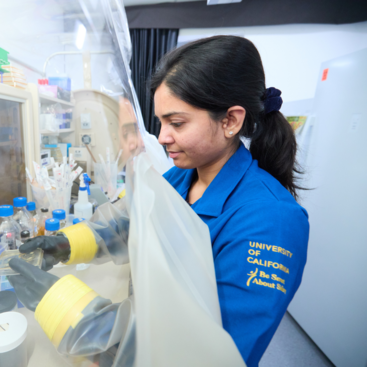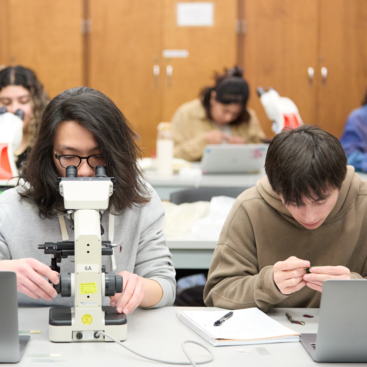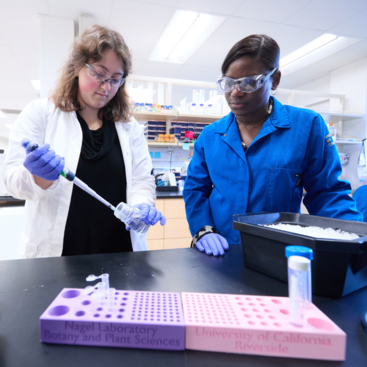Liz is the Transfer Success Coordinator in the CNAS Undergraduate Academic Advising Center (UAAC).
Liz began her higher education journey at Santa Ana College before transferring to UC Riverside and earning her Bachelor's degree in Chicano Studies. Her love for education led to her obtaining her Master's degree in Higher Education from the University of Redlands. She has a background in Admissions and Advising and currently oversees the Transfer Connections Program.
We recently sat down with Liz and asked her some questions about the UCR transfer community:
How would you describe the UCR transfer community?
The transfer community at UCR is a vibrant and diverse group of students who are welcoming.
What’s something every prospective transfer student should know about CNAS?
Prospective transfer students should know that the College of Natural and Agricultural Sciences (CNAS) at UCR provides an abundance of research opportunities and comprehensive support within their disciplines. CNAS offers a unique chance to get involved in research even before officially becoming a UCR student through the 10-week Summer in Research and Engineering (RISE) Program, available the summer before transferring. There are a ton of faculty and staff in CNAS that eager to support our CNAS transfers and want to help them find ways to get involved and dive deeper into their areas of interest. Upon arriving at UCR, transfer students can benefit from the Transfer Connections Program, which is specifically designed to help them build connections, network, and get involved in research. Additionally, CNAS offers a 10-week, 1-unit Transfer Transition Seminar during the Fall and Winter quarters, aimed at helping new transfers smoothly acclimate to UCR and thrive in their academic pursuits.
What do you enjoy most about working with CNAS transfer students?
I love seeing their enthusiasm for their majors. It’s rewarding to get to know them on a deeper level, learn about their personal and professional goals, and hear about the challenges they’ve overcome. Witnessing their growth in their fields is truly inspiring. I also enjoy connecting them to the right resources and being a resource for them myself.
What resources are there to support new CNAS transfer students?
Resources available to CNAS Transfers are the Transfer Connections Program, it is a peer-led program specifically designed to help transfer students build connections, network, and get involved in research. Through CNAS Transfer Connections, new transfer students are paired with current UCR transfers, providing valuable peer mentorship. Additionally, CNAS offers a 10-week, 1-unit Transfer Transition Seminar during the Fall and Winter quarters, aimed at helping new transfers smoothly acclimate to UCR and thrive in their academic pursuits.
Can you tell us more about the CNAS Transfer Connections Peer Mentors?
We have 10 CNAS Transfer Connections Peer Mentors whose majors span the Life Sciences, Physical Sciences, and Mathematical Sciences. Among them, we have several pre-med transfers available to assist students interested in medical school or health professions. Our Peer Mentors are matched with their mentees based on shared majors and career aspirations, ensuring relevant and personalized guidance. They are highly knowledgeable about UCR, CNAS, and the many resources available on campus. Actively involved in labs, research, and extracurricular activities, both on campus and in the community, our Peer Mentors also play a key role in supporting the programming for the Transfer Connections Program. They help plan and execute Transfer Socials, Faculty-Student Mixers, and End-of-the-Year Goodie Bag Socials. Additionally, they conduct outreach to STEM students at local community colleges, extending their support beyond UCR.
What’s the key to being a successful CNAS transfer student?
The key to being a successful CNAS transfer student is to make the most of the resources available to you, including the CNAS Transfer Connections Program and it’s mentors, the CNAS Transfer Success Coordinator, and your assigned academic advisor. We’re all here to support you in achieving your academic and personal goals. By actively utilizing these resources, you'll set yourself up for success at UCR. Getting involved in research or joining a club can further help you build a strong support network and enhance your university experience.
What happens after transfer students submit their Statement of Intent to Register (SIR)?
Once a student submits their SIR, they will want to make sure to submit their official transcripts by the July 1st deadline. Once the transcripts are submitted our Admissions office begins data entering and our College Team begins evaluating transcripts. This allows advisors to know what classes from your CC transfer over and what they articulate to so they know what classes you should prioritize while here at UCR. Students will also receive information on how to sign up for Transfer Orientation and will also receive communication from the CNAS Transfer Success Coordinator inviting you to sign up for pre-mentorship.



